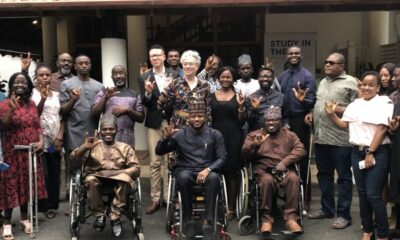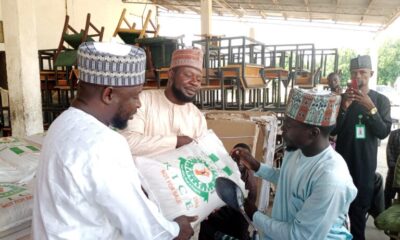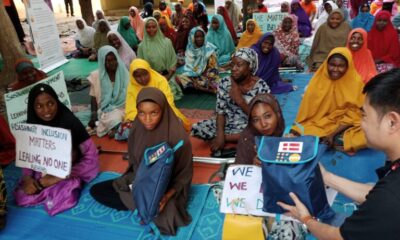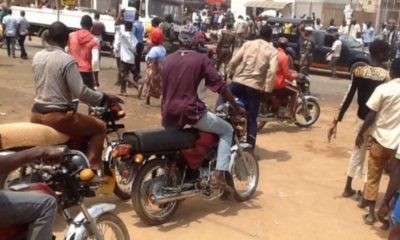Headline
Consider us for palliatives, PWDs in Ekiti appeal to Gov. Oyebanji

Some persons living with disabilities (PwDs) in Ikole-Ekiti on Tuesday appealed to the Ekiti State Governor, Mr Biodun Oyebanji, to make provisions for palliatives for them, to cushion the effect of fuel subsidy removal.
A cross section of the physically challenged individuals who spoke with the News Agency of Nigeria (NAN) in Oye-Ekiti said they were currently experiencing hardship and did not have money to buy foodstuffs.
One of the PWDS, Mr Sodiq Haruna lamented that the cost of living for him had become unbearable as he could no longer eat twice daily.
He said many residents who always gave him money to feed were no longer giving him because they hardly had enough for themselves.
Haruna appealed to the state governor, Mr Biodun Oyebanji, to assist the PWDs with palliatives especially with food items to enable them feed to be alive.
“ Honestly, this is the worst period of my life, I eat once in a day and hardly have N500 to buy food.
“Some of my friends are equally experiencing even worse hardship because they are blind and find it difficult to move around freely to find food to eat.
“ I just want to beg our governor to give us palliatives so that hunger will not kill disabled persons in Ekiti,” he appealed.
A visually impaired person, Mr Moses Godwin, said that he could not engage in any job because of his inability to see.
He appealed to both the local government councils and state government to consider the PWDs in the community for palliatives.
Another physically challenged/orthopedically disabled man, Mr Sola Ogunniyi, said the cost of food, drugs and transportation were no longer affordable for him.
He noted that the decision of the Federal Government to remove fuel subsidy was good but relief packages should have been, first of all, provided for the less privileged ones.
“As I speak to you, the cost of food has become too expensive for me to buy because as a shoemaker, I am currently experiencing low patronage as a result of lack of money.
” The decision by the Federal Government to remove fuel subsidy is a good development but some of us who are disabled need government financial support to fend for ourselves,” he said.
Ogunniyi appealed to Gov. Oyebanji to give priority to the welfare of persons with disabilities in Ekiti.
Similarly, Mr Godswill Ekemefuna, another physically challenged man, appealed to the state governor to approve palliatives for PWDs in the state.
He noted that they were the most vulnerable to the current challenges in the country and needed support from both the federal and states governments.
Headline
EFCC bars dollar transactions, orders embassies to charge in naira

The Economic and Financial Crimes Commission has barred foreign missions based in Nigeria from transacting in foreign currencies and mandated them to use Naira in their financial businesses.
The EFCC has also mandated Nigerian foreign missions domiciled abroad to accept Naira in their financial businesses.
The anti-graft agency said the move is to tackle the dollarisation of the Nigerian economy and the degradation of the naira
The Commission, therefore, asked the government to stop foreign missions in Nigeria from charging visa and other consular services in foreign denominations.
The EFCC gave the advisory in a letter to the Minister of Foreign Affairs, Amb. Yusuf Tuggar, for onward transmission to all foreign missions in the country.
In the letter, the EFCC said it issued the advisory because the practice of paying for consular services in dollars was in conflict with extant laws and financial regulations in Nigeria.
In a letter dated April 5, 2024, which was addressed to the Minister of Foreign Affairs, Ambassador Yusuf Tuggar, titled: “EFCC Advisory to Foreign Missions against Invoicing in US Dollar,” the EFCC Chairman, Ola Olukoyede expressed dismay over the invoicing of consular services in Nigeria by foreign missions in dollars.
The EFCC cited Section 20(1) of the Central Bank of Nigeria Act, 2007, which makes currencies issued by the apex bank the only legal tender in Nigeria.
The letter read, “I present to you the compliments of the Economic and Financial Crimes Commission, and wish to notify you about the commission’s observation, with dismay, regarding the unhealthy practice by some foreign missions to invoice consular services to Nigerians and other foreign nationals in the country in United States dollar ($).
“It states that ‘the currency notes issued by the Bank shall be the legal tender in Nigeria on their face value for the payment of any amount’.
“This presupposes that any transaction in currencies other than the naira anywhere in Nigeria contravenes the law and is, therefore, illegal.”
The commission further stated that the rejection of the naira for consular services in Nigeria by certain missions, along with non-compliance with foreign exchange regulations in determining service costs, is not just unlawful but also undermines the nation’s sovereignty embodied in its official currency.
The letter continues: “This trend can no longer be tolerated, especially in a volatile economic environment where the country’s macroeconomic policies are constantly under attack by all manner of state and non-state actors.
“In light of the above, you may wish to convey the commission’s displeasure to all missions in Nigeria and restate Nigeria’s desire for their operations not to conflict with extant laws and regulations in the country.”
Diplomatic sources said yesterday, May 10, that some embassies were wondering whether the EFCC’s advisory represented the position of the Federal Government.
Headline
Prince Harry visits sick Nigerian soldiers in Kaduna

Prince Harry and his team visited the 44 Nigerian Army Reference Hospital in Kaduna to interact with wounded soldiers who are receiving treatment.
The Duke of Sussex is in Nigeria with his wife to champion the Invictus Games, which Harry founded to aid the rehabilitation of wounded and sick servicemembers and veterans.
Nigeria joined the Invictus Community of Nations in 2022 becoming the first African country to join.
Prince Harry’s visit to Kaduna came 68 years after his late grandmother Queen Elizabeth II visited the state during the time of the late Premier of Northern Region Sir Ahmadu Bello.




-

 Headline5 days ago
Headline5 days agoSuspend cybersecurity levy– Reps to CBN
-

 Business5 days ago
Business5 days agoNigeria needs over $2bn to revive Ajaokuta Steel Plant, says Minister
-

 Headline3 days ago
Headline3 days agoPrince Harry visits sick Nigerian soldiers in Kaduna
-

 Entertainment3 days ago
Entertainment3 days agoAMVCA Cultural Day: BBNaija’s Neo, Venita win Best Dressed Male, Female
-

 Headline5 days ago
Headline5 days agoTinubu resumes work after foreign trip
-

 News5 days ago
News5 days agoShan George’s money returned to Zenith Bank account
-

 Metro3 days ago
Metro3 days agoEx-Sports Minister laments after hospital neglected him for hours over N80000 deposit











